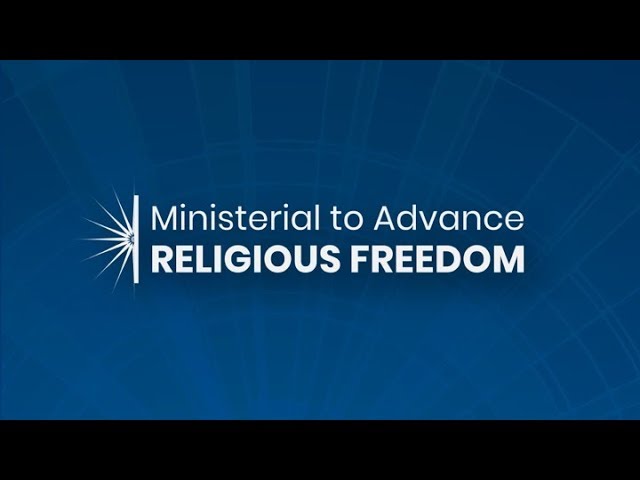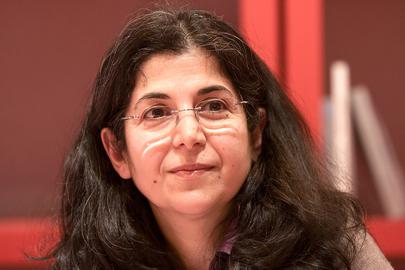On Tuesday, July 16, something remarkable resounded through the Dean Acheson auditorium at the US State Department: the words of the Holy Koran.
“‘Yaa ayyuhannas’— O mankind!” recited Dr. Farid Ahmed, a homeopathic consultant, during his remarks on the first full day of the US government’s second Ministerial to Advance Religious Freedom in Washington, D.C.
Ahmed, a survivor of the March 15 attack against the Muslim community in Christchurch, New Zealand, was invited to speak and share his story along with more than 20 other survivors of religious persecution.
“‘Innaa khalaqnaakum min thakarin wa-unthaa.’— I have created you from a single pair of male and female, Adam and Eve,” his recitation continued.
He then paused, his voice becoming quieter, though no less powerful. “So you are all children of Adam and Eve. You are one large human family. You are brothers and sisters.” Ahmed’s remarks were featured in the first session of the day’s official events on July 16, as were the remarks of Jeffrey Myers, a survivor of the October 2018 attack on the Tree of Life synagogue in Pittsburgh, where he is rabbi. The attack was carried out by a man who had previously expressed support for white supremacist ideology. Also invited to speak was Yamini Ravindran, a legal and advocacy coordinator for the National Christian Evangelical Alliance of Sri Lanka, which is part of the Christian community still grappling with the aftermath of the bombings by ISIS that killed more than 250 people on Easter Sunday this year.
At the start of the day, Sam Brownback, US Ambassador at Large for International Religious Freedom, told the participants that the ministerial is the largest human rights event to have been hosted at the State Department, and the largest religious freedom event ever hosted around the world.
He called on the gathered community to join together to “boldly fight for religious freedom.”
The first two days of the ministerial (July 16 and 17) had been crafted to optimize relationship-building among participants from a wide swath of faith communities from around the world. Participants have had access to both high-profile presentations and to smaller, more intimate conversations.
In addition to hearing from Secretary of State Mike Pompeo at the beginning of the ministerial, the participants had the chance to hear from prominent US figures on the afternoon of July 16, including House Speaker Nancy Pelosi (Democrat, California) and retired congressman Frank Wolf, who contributed to the passage of the 1998 International Religious Freedom Act (IRFA), which established religious freedom as a US government foreign policy priority, according to a press release issued by the United States Commission on International Religious Freedom. Both spoke on the subject of religious freedom in China.
At the start of the first day, Myers discussed the difficulties he faced as a rabbi who not only survived mass violence but is also striving to guide his community in the aftermath, which often includes fear — and crises of faith.
“How do I answer a parent whose child is too afraid to attend religious services?” he asked.
Ravindran shared similar experiences from her community, saying some homes in Sri Lanka will never open again because whole families were lost in the Easter bombings.
“It has left us with a fear psychosis like never before,” she said.
But the survivors also left the ministerial’s participants with calls to action to ensure that other communities do not face the same violence.
“How might society address the problems of racism and bigotry?” Rabbi Myers asked, noting that the same prejudice that stole lives among his congregation had also targeted the African American community at the Emmanuel AME Church in Charleston, South Carolina in 2015, and the Sikh community at the gurdwara in Oak Creek, Wisconsin in 2012.
“I can submit this,” he continued. “Only when it is so totally unacceptable in society will any ill disappear.”
He added that government leaders play an especially important role in modeling moral behavior, while religious and civic groups must “foreswear racism and bigotry.”
Interfaith Families
Members of such religious and civic groups were happy to have the chance to participate in the ministerial and discuss their own commitments to preventing religious persecution.
Rizwan Jaka, the chair of interfaith, government, and media relations at the All Dulles Area Muslim Society, known as the ADAMS Center, told IranWire that the mosque, which is the second largest in the US, with 11 branches and satellites in Virginia and Washington, D.C., is “an interfaith family.”
He said that two synagogues have hosted members of the ADAMS Center community for the last decade, while a church has done the same for another part of the community for more than 20 years.
As such, interfaith solidarity and collaboration are core elements of the mosque’s mission.
“We work together as Muslim, Christian, Jewish, Hindu, Buddhist, Sikh, Baha’i, Zoroastrian and all faith communities on a regular basis,” he said.
Part of that work has meant carrying out actions whenever one community within the family has met with tragedy — an all too common occurrence.
Jaka recounted that when the Tree of Life attack happened, the ADAMS Center was quick to organize vigils at synagogues across the community.
Months later, he said, national Jewish leaders joined his Muslim community for Shabbat on the night of Friday, March 15, following the Christchurch attack, while Christian leaders also joined in a vigil.
Then came the attack in Sri Lanka barely one month later, during Easter services, which he called “unimaginable.” Jaka — who said he had already been planning to attend Easter services, as the ADAMS Center regularly sends delegations to Christmas and Easter celebrations — delivered his condolences to the local Christian community. The mosque then hosted a vigil the following day at its branch in Ashburn, Virginia, which was organized with the local Sri Lankan Muslim, Christian, and Hindu communities.
Interfaith solidarity was an equally important theme at the ministerial for the survivors of the Pittsburgh, Christchurch, and Sri Lanka attacks.
Rabbi Myers spoke of how the same racism that targeted his Jewish community has also impacted Muslims, Sikhs, Buddhists, and other groups in the US.
Ravindran, who shared stories of those devastated by the Easter bombings, was also quick to emphasize that the Christian community is “deeply resilient and compassionate,” taking care to reach out to Muslim communities to prevent backlash. She reminded people that there had been an increase in hate speech on social media against Muslims.
Dr. Ahmed, who not only experienced the Christchurch attack but also lost his wife, Husna, spoke not just of solidarity, but also of forgiveness.
For him, to forgive the Christchurch attacker — the murderer of his wife — was not remarkable, just deeply Muslim. It was something drawn from the verse he recited at the beginning of his remarks, a verse emphasizing common humanity.
“I forgive him,” Dr. Ahmed said, “because he is my human brother.”
Ravindran also emphasized the power of forgiveness. She said that though the victims of the attacks are “broken,” “suffering,” and “in great pain,” they are also “on the path to recovery...because they have no hate in their hearts.”
Quoting Nelson Mandela, she said, “‘Courageous people do not fear forgiving for the sake of peace.’”
As with Dr. Ahmed’s recitation, it was a message that resounded.
visit the accountability section
In this section of Iran Wire, you can contact the officials and launch your campaign for various problems




![A survivor of religious persecution speaks with the press at the Ministerial to Advance Religious Freedom in Washington D.C. on July 17, 2019 [State Department photo/Public Domain] A survivor of religious persecution speaks with the press at the Ministerial to Advance Religious Freedom in Washington D.C. on July 17, 2019 [State Department photo/Public Domain]](https://static.prod.iranwire.com/_versions_jpg/filer_public/2a/8c/2a8caa04-9826-4369-a1e3-0e5ec5785c4d/9-survivor_unnamed__v516x270__.jpg)
![A breakout session at the ministerial on July 17, 2019 [State Department photo by Ralph Alswang/Public Domain] A breakout session at the ministerial on July 17, 2019 [State Department photo by Ralph Alswang/Public Domain]](https://static.prod.iranwire.com/_versions_jpg/filer_public/01/ba/01ba211f-88af-4c25-96ed-18a9ae1a498f/10-breakout_group_unnamed__v516x270__.jpg)
![US Secretary of State Michael R. Pompeo with Ivanir dos Santos of Brazil at the 2019 International Religious Freedom Awards ceremony, July 17 [State Department photo by Michael Gross/Public Domain] US Secretary of State Michael R. Pompeo with Ivanir dos Santos of Brazil at the 2019 International Religious Freedom Awards ceremony, July 17 [State Department photo by Michael Gross/Public Domain]](https://static.prod.iranwire.com/_versions_jpg/filer_public/7e/bd/7ebdb629-2089-40d7-9a34-3b6596909b0e/3-pompeo_with_2__v516x270__.jpg)
![Dr Farid Ahmed speaking at the ministerial [State Department photo/Public Domain] Dr Farid Ahmed speaking at the ministerial [State Department photo/Public Domain]](https://static.prod.iranwire.com/_versions_jpg/filer_public/06/58/065869e6-ac38-41b1-9dee-8dd793d96c74/dr_ahmed__v516x270__.jpg)
![Yamini Ravindran from Sri Lanka’s Christian community, which is still grappling with the aftermath of the Easter bombings by ISIS [State Department photo by Michael Gross/Public Domain] Yamini Ravindran from Sri Lanka’s Christian community, which is still grappling with the aftermath of the Easter bombings by ISIS [State Department photo by Michael Gross/Public Domain]](https://static.prod.iranwire.com/_versions_jpg/filer_public/24/07/2407b886-4008-4ff1-825c-1e7d5dfd099a/yamini_ravindran__v516x270__.jpg)





















comments